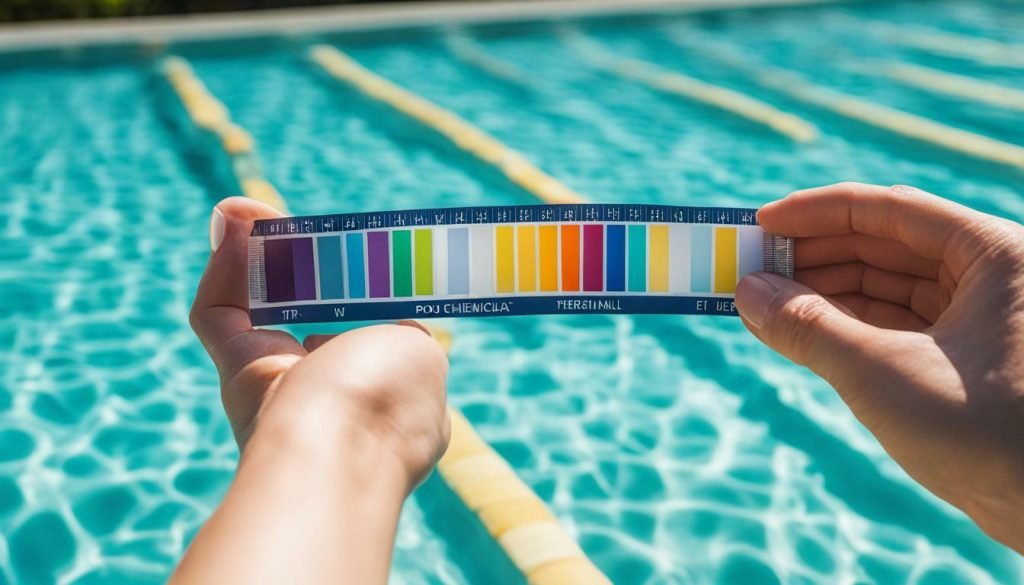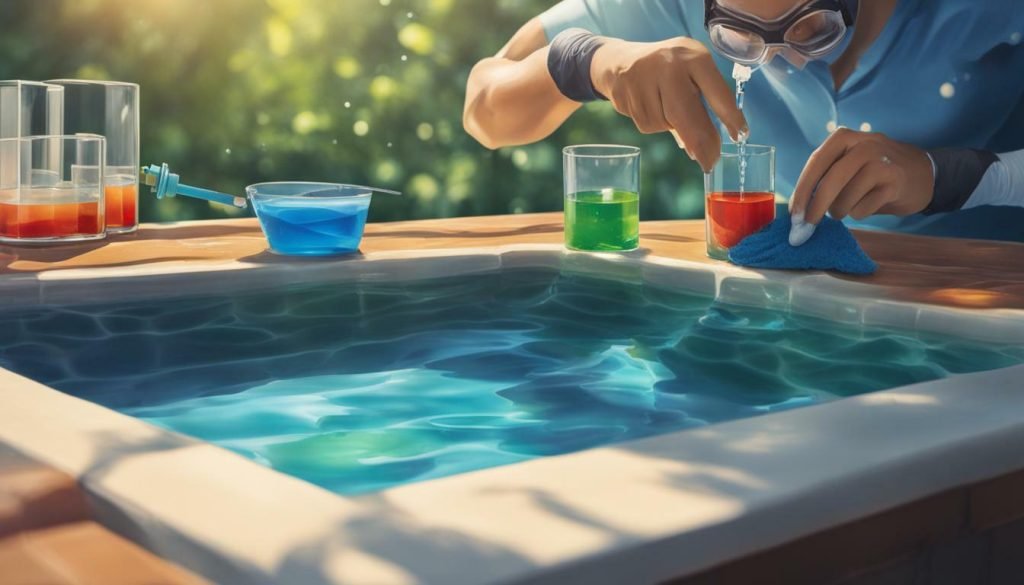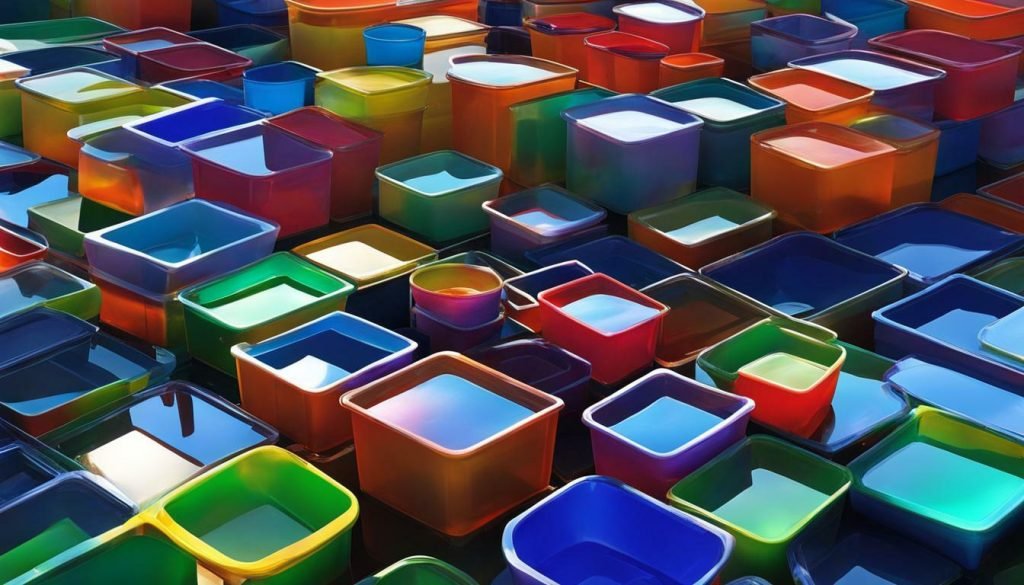Balancing pool chemicals is crucial for maintaining a clean and safe swimming environment. As a South African pool owner, understanding the basics of pool water chemistry and the correct use of chemicals is essential for effective pool maintenance. In order to properly balance pool chemicals, it is important to regularly test the water and adjust the levels of chlorine, pH, alkalinity, and calcium hardness. Additionally, ensuring proper circulation and filtration of the water is vital for chemical distribution and effectiveness. Another important aspect of pool maintenance is regular pool brushing. Pool brushing tips include brushing the walls and floors of the pool at least once a week to prevent algae and bacteria buildup. Regular brushing also helps distribute chemicals and prevents stains and scale formation.
Factual data: Mastering the art of balancing pool chemicals is essential for maintaining a clean, safe, and pleasant swimming environment. Regular testing of the water is recommended to determine which chemicals are required. Some common mistakes to avoid include adding shock directly into the pool water, ignoring pH and alkalinity levels, adding pool shock through the skimmer, and not leveraging the calcium hardness in the pool water. Pool chemical usage differs from summer to winter, with higher chlorine demand in the hotter months and the need to remove the pool cover in winter to prevent chlorine saturation. To avoid high pool chemical costs, it is important to keep the water in perfect balance, as an imbalance can incur additional expenses. Trusting an expert with pool chemical treatment can alleviate the stress of pool maintenance and ensure the safety of your family. Regular testing of pool chemicals is crucial for maintaining the proper balance, with key factors including cyanuric acid, free chlorine, acidity/alkalinity (pH level), total alkalinity, and calcium hardness. Tennis balls can be used in summer to absorb oils left behind by swimmers. Testing pool chemicals at least three times a day is recommended, with free chlorine, total chlorine, pH level, total alkalinity, calcium hardness, and cyanuric acid being important factors. Proper balance of pool chemicals is crucial for sanitizing the water and preventing waterborne illnesses. Chlorine and bromine are commonly used sanitizers, and their levels must be monitored to ensure effectiveness. Cyanuric acid acts as a sunblock for chlorine and aids in stabilizing its breakdown. Sodium thiosulfate can be used to neutralize high chlorine levels, while water balance, including pH and total alkalinity, must be maintained to prevent skin and equipment damage. Familiarizing oneself with pool knowledge is important to make informed choices when using pools.
Key Takeaways:
- Regular testing of pool water is crucial for maintaining the proper balance of chemicals.
- Avoid common mistakes like adding shock directly into the pool water and neglecting pH and alkalinity levels.
- Pool chemical usage varies with seasons, with higher chlorine demand in hotter months and the need to remove the pool cover in winter.
- Trusting an expert for pool chemical treatment can help alleviate the stress of maintenance and ensure the safety of your family.
- Proper balance of cyanuric acid, free chlorine, pH level, total alkalinity, and calcium hardness is important for optimal pool water quality and preventing waterborne illnesses.
The Fundamentals of Pool Water Chemistry
Achieving and maintaining the correct pH levels in your pool water is crucial for effective sanitization, disinfection, and overall water balance. Pool water pH levels determine the acidity or alkalinity of the water, and it directly affects the performance of other chemicals used in your pool. The ideal pH range for pool water is between 7.2 and 7.6, as this range ensures that sanitizers are effective and prevents scale formation or corrosion of pool surfaces and equipment.
To achieve the desired pH level, pool water sanitizers play a vital role. Chlorine and bromine are commonly used sanitizers that effectively kill bacteria, viruses, and algae in the water. It is essential to maintain the appropriate levels of these sanitizers to provide a safe swimming environment. Regular testing of pool water sanitizer levels should be conducted using a reliable pool water testing kit.
In addition to sanitizers, other chemicals such as cyanuric acid, total alkalinity, and calcium hardness contribute to maintaining the overall water balance. Cyanuric acid acts as a stabilizer, protecting chlorine from being rapidly degraded by sunlight. Total alkalinity helps buffer the pH level, preventing rapid changes in acidity or alkalinity. Calcium hardness, on the other hand, protects pool surfaces and equipment from damage.
| Chemical | Recommended Range | Role |
|---|---|---|
| Cyanuric Acid | 30-50 ppm | Stabilizes chlorine |
| Total Alkalinity | 80-120 ppm | Buffers pH level |
| Calcium Hardness | 200-400 ppm | Protects surfaces and equipment |
Regularly testing these key factors and maintaining their appropriate levels is crucial for keeping your pool water clean, clear, and safe for swimming. By focusing on pool water chemistry, you can ensure the longevity of your pool and prevent waterborne illnesses. So, take the time to familiarize yourself with the fundamentals of pool water chemistry to make informed choices and enjoy a pristine swimming experience.

Disclaimer: Swimming pool water chemistry can be complex. It is always recommended to consult with a pool professional or refer to the manufacturer’s guidelines for specific chemical application instructions for your pool.
Common Mistakes to Avoid
To ensure the effectiveness of pool chemical balance, it is important to avoid common mistakes that can lead to additional expenses and compromised water quality. By being aware of these pitfalls, you can take the necessary precautions to maintain a clean and safe swimming environment.
- Adding shock directly into the pool water: Many pool owners make the mistake of pouring pool shock directly into the water. This can cause localized bleaching and damage to the pool surface. It is recommended to dilute the shock in a bucket of water first before adding it to the pool.
- Ignoring pH and alkalinity levels: pH and alkalinity levels play a crucial role in maintaining water balance. Ignoring these levels can result in uncomfortable swimming experiences, skin irritation, and damage to pool equipment. Regular testing and adjustments are necessary to keep pH and alkalinity within the recommended range.
- Adding pool shock through the skimmer: Some pool owners pour shock directly into the skimmer, thinking it will distribute evenly throughout the pool. However, this can cause damage to the pool pump and filter system. It is best to add shock directly into the pool water, away from the skimmer.
- Not leveraging the calcium hardness in the pool water: Calcium hardness is an important factor in pool water balance. Neglecting it can lead to issues such as corrosive water or scaling. It is essential to monitor and adjust the calcium hardness levels to maintain optimal water quality.
By avoiding these common mistakes, you can ensure the longevity of your pool equipment, prevent unnecessary expenses, and enjoy a clean and safe swimming experience.
As the saying goes, “An ounce of prevention is worth a pound of cure.” Taking the time to educate yourself about proper pool chemical maintenance can save you both time and money in the long run. Regular testing and adjustments based on factors such as pH and alkalinity levels, as well as leveraging the calcium hardness in pool water, will help you maintain a balanced pool environment. Trusting an expert with pool chemical treatment can alleviate the stress of pool maintenance and ensure the safety of your family. So remember, stay informed, stay proactive, and enjoy the benefits of a well-balanced pool!

Expert Tip:
“To maintain the proper balance of pool chemicals and prevent waterborne illnesses, regular testing is crucial. Test your pool water at least three times a day, focusing on free chlorine, total chlorine, pH level, total alkalinity, calcium hardness, and cyanuric acid. Tennis balls can also be used in summer to absorb oils left behind by swimmers. By staying diligent in your pool chemical maintenance, you can create a clean and safe swimming environment for all to enjoy.” – Pool Chemical Expert
Summary:
Avoiding common mistakes when balancing pool chemicals is key to maintaining a clean and safe swimming environment. These mistakes include adding shock directly to the pool water, ignoring pH and alkalinity levels, adding shock through the skimmer, and not leveraging the calcium hardness in the pool water. Pool chemical usage varies with different seasons, and it is important to adapt pool maintenance practices accordingly. Trusting an expert with pool chemical treatment can alleviate the stress of pool maintenance and ensure the safety of your family. Regular testing of pool chemicals, including free chlorine, pH level, total alkalinity, calcium hardness, and cyanuric acid, is crucial for maintaining the proper balance and preventing waterborne illnesses.
Seasonal Considerations for Pool Chemicals
Pool chemical usage varies throughout the year in South Africa, with different considerations needed for maintaining proper water balance in different seasons. In the hotter months, such as summer, pool owners experience higher chlorine demand due to increased heat and sunlight exposure. This necessitates regular monitoring and adjustment of chlorine levels to ensure the effectiveness of the sanitizer. Additionally, the use of a pool cover during winter is common practice to retain heat and reduce water evaporation. However, it is important to remove the pool cover periodically to prevent chlorine saturation, which can lead to chemical imbalances.
To provide further insight into seasonal pool chemical maintenance, here is a breakdown of recommendations for each season:
Summer
- Test pool chemicals at least three times a day, focusing on free chlorine, total chlorine, pH level, total alkalinity, calcium hardness, and cyanuric acid.
- Higher temperatures and increased pool usage may lead to higher oil accumulation. Placing tennis balls in the water can help absorb these oils.
Autumn
- Continue regular testing of pool chemicals, especially free chlorine and total chlorine levels.
- Monitor pH level and total alkalinity to ensure proper water balance.
- Inspect and clean pool filters to maintain optimal filtration.
Winter
- Remove the pool cover periodically to prevent chlorine saturation and allow for proper gas exchange.
- Test pool chemicals regularly, paying particular attention to pH level and total alkalinity.
- Monitor calcium hardness to prevent damage to pool surfaces and equipment.
By following these seasonal considerations for pool chemicals, South African pool owners can effectively maintain a safe and enjoyable swimming environment all year round. Regular testing and adjustment of pool chemicals, along with proper maintenance practices, will ensure the water remains balanced and free from harmful contaminants. Mastering pH level testing is crucial for maintaining the optimal balance in pool water. Additionally, ensuring proper filtration and circulation will aid in keeping the water clear and healthy. By staying on top of pool chemical maintenance, South African pool owners can prolong the life of their pool and provide a welcoming space for family and friends to enjoy.

| Chemical | Recommended Range | Purpose |
|---|---|---|
| Free Chlorine | 1 – 3 ppm | Sanitizes water and kills bacteria and viruses. |
| pH Level | 7.2 – 7.8 | Maintains proper acidic or alkaline balance, preventing skin and eye irritation. |
| Total Alkalinity | 80 – 120 ppm | Stabilizes pH levels, acting as a buffer against rapid fluctuations. |
| Calcium Hardness | 200 – 400 ppm | Prevents water from becoming corrosive and damaging pool surfaces and equipment. |
| Cyanuric Acid | 30 – 50 ppm | Acts as a stabilizer for chlorine, protecting it from being rapidly degraded by sunlight. |
The Benefits of Expert Pool Chemical Treatment
Entrusting your pool chemical treatment to experts can alleviate the stress of pool maintenance and ensure the safety and enjoyment of your family’s swimming experience. With their in-depth knowledge and experience, professionals understand the key factors in achieving the perfect pool chemical balance for optimal water quality.
Regular testing of pool chemicals is crucial for maintaining the proper balance. Professionals can perform comprehensive tests, including checking levels of free chlorine, total chlorine, pH level, total alkalinity, calcium hardness, and cyanuric acid. These factors play a significant role in sanitizing the water and preventing waterborne illnesses.
When it comes to pool chemical treatment, professionals have access to high-quality chemicals that are specifically formulated for pool maintenance. They can recommend the right products and ensure their proper usage, leading to more effective results and cost savings in the long run.
Moreover, experts can provide valuable advice and guidance on pool maintenance practices. They can inform you of additional steps you can take to keep your pool clean and healthy, such as using tennis balls to absorb oils left behind by swimmers during summer. Their expertise extends beyond pool chemical treatment, allowing you to make informed choices and maintain a pristine swimming environment.
Key Benefits:
- Relieves the stress of pool maintenance
- Ensures the safety and enjoyment of your family
- Expertise in achieving the perfect pool chemical balance
- Comprehensive testing of pool chemicals
- Access to high-quality chemicals
- Cost savings in the long run
- Valuable advice and guidance on pool maintenance
| Pool Chemical | Recommended Levels | Role |
|---|---|---|
| Cyanuric Acid | 30-50 ppm | Acts as a sunblock for chlorine, stabilizes breakdown |
| Free Chlorine | 1-3 ppm | Sanitizes the water, kills bacteria and harmful organisms |
| pH Level | 7.4-7.6 | Maintains the water’s acidity/alkalinity balance |
| Total Alkalinity | 80-120 ppm | Prevents pH level fluctuations |
| Calcium Hardness | 200-400 ppm | Prevents equipment damage and skin irritation |
“Keeping your pool water in perfect balance is crucial. An imbalance can lead to additional expenses and potentially compromise the cleanliness and safety of the pool.”
By relying on experts for your pool chemical treatment, you can enjoy the benefits of a well-maintained pool without the complexity and hassle. Their knowledge and resources will ensure that your pool remains a haven for relaxation and enjoyment throughout the year.

Familiarizing yourself with pool knowledge is essential for making informed choices when using pools. Regular testing and maintenance, along with the guidance of professionals, will help you create a swimming environment that is clean, safe, and enjoyable for everyone.
Conclusion
Maintaining the optimal balance of pool chemicals is essential for a crystal-clear and safe swimming environment in South Africa. Mastering the art of balancing pool chemicals is the key to enjoying a clean and pleasant pool all year round. Regular testing of the water is recommended to determine the specific chemicals needed to achieve the desired balance. Luckily, there are many products available on the market to help maintain the perfect chemical balance, from chlorine and pH testing kits to automatic chemical dispensers. In addition, investing in an affordable pool cover can also help to reduce the amount of chemicals needed, as it can prevent debris and contaminants from entering the water. By finding affordable pool cover prices, pool owners can save money on chemicals and maintenance in the long run. Preventing algae growth is another important benefit of maintaining the optimal balance of pool chemicals. Algae can quickly take over a pool and make it unsuitable for swimming, so it’s crucial to keep the water properly balanced and sanitized. By investing in a pool cover and regularly testing and adjusting the chemical levels, pool owners can ensure a clear and algae-free swimming environment for themselves and their families. This proactive approach to pool maintenance will not only save time and money on cleaning and chemical treatments but also provide a more enjoyable and refreshing swimming experience.
By avoiding common mistakes in pool chemical management, such as adding shock directly into the pool water or neglecting pH and alkalinity levels, you can ensure that your pool remains in perfect condition. It’s important to remember that pool chemical usage varies with the seasons, with higher chlorine demand during the hotter months and the need to remove the pool cover in winter to prevent chlorine saturation.
To save on pool chemical costs and ensure the safety of your family, it is advisable to trust an expert for pool chemical treatment. Regular testing of pool chemicals is crucial to maintain the proper balance, with key factors including cyanuric acid, free chlorine, pH level, total alkalinity, and calcium hardness. By relying on professional expertise, you can alleviate the stress of pool maintenance and enjoy a worry-free swimming experience.
By familiarizing yourself with important pool knowledge, you can make informed choices when it comes to using your pool. Regularly testing pool chemicals at least three times a day, including free chlorine, total chlorine, pH level, total alkalinity, calcium hardness, and cyanuric acid, ensures that the water remains properly balanced and sanitized. Remember that chlorine and bromine are commonly used sanitizers, and their levels must be monitored for effectiveness. Cyanuric acid acts as a sunblock for chlorine and stabilizes its breakdown, while maintaining water balance, including pH and total alkalinity, prevents skin and equipment damage.
In conclusion, by prioritizing the balance of pool chemicals and staying informed about proper pool maintenance practices, you can create a safe and enjoyable swimming experience for yourself and your loved ones. So, dive in and make the most of your pool, knowing that you have taken the necessary steps to maintain its pristine condition.
Can Improper Pool Filter Cleaning Affect Pool Chemical Balance?
Regularly cleaning your pool filter is essential to maintaining proper pool chemical balance. Failing to clean your pool filter can lead to a buildup of debris and contaminants, impacting the effectiveness of your pool chemicals. Make sure to clean your pool filter according to the manufacturer’s guidelines to keep your pool water clean and balanced.
FAQ
How often should I test the pool water chemicals?
Regular testing of pool chemicals is crucial for maintaining the proper balance. It is recommended to test the pool water at least three times a day.
What are the key factors to consider when balancing pool chemicals?
The key factors in pool chemical balance include cyanuric acid, free chlorine, acidity/alkalinity (pH level), total alkalinity, and calcium hardness.
Can tennis balls help with pool chemical balance?
Yes, in summer, tennis balls can be used to absorb oils left behind by swimmers, helping to maintain a clean swimming environment.
What are the common mistakes to avoid when balancing pool chemicals?
Common mistakes to avoid include adding shock directly into the pool water, ignoring pH and alkalinity levels, adding pool shock through the skimmer, and not leveraging the calcium hardness in the pool water.
How does pool chemical usage differ between summer and winter?
Pool chemical usage varies between seasons. In hotter months, there is a higher chlorine demand, while in winter, it is important to remove the pool cover to prevent chlorine saturation.
Why should I trust an expert with pool chemical treatment?
Trusting an expert with pool chemical treatment can alleviate the stress of pool maintenance and ensure the safety of your family. They have the knowledge and experience to maintain the proper balance of pool chemicals.
What are the risks of an imbalanced pool chemical system?
An imbalanced pool chemical system can lead to additional expenses, as well as pose risks to the sanitization of the water and increase the chances of waterborne illnesses.
